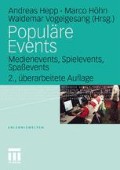Zusammenfassung
Die Diskussion um Medienevents weist seit ihren Anfängen Bezüge zu religiösen Fragen auf. So konstatieren bereits Daniel Dayan und Elihu Katz (1992) insofern eine enge Verbindung zwischen Medienevents und Religion, als Medienereignisse „mit zeremonieller Verehrung und in einem Tonfall, der Heiligkeit und Ehrfurcht zum Ausdruck bringt“ (ebd. 12), präsentiert werden und sie „in der Zivilreligion eine Rolle spielen“ (ebd. 16): „Wie religiöse Feiertage bedeuten größere Medienevents eine Unterbrechung von Routinen, arbeitsfreie Tage, Normen der Teilnahme an Zeremonien und Ritualen, […] die Erfahrung der Integration in ein kulturelles Zentrum.“ (ebd.) Auch darüber hinaus finden sich in der Forschung zu Medienereignissen immer wieder Verweise auf Religion. Eric Rothenbuhler (1988: 78) etwa beschreibt in seinen frühen Arbeiten die Olympischen Spiele als rituelles Medienevent mit einer quasi-religiösen Dimension, und ähnlich untersucht auch Knut Lundby (1997: 161) „sakrale Momente“ in der Eröffnungsfeier der Olympischen Winterspiele in Norwegen 1994.
Access this chapter
Tax calculation will be finalised at checkout
Purchases are for personal use only
Preview
Unable to display preview. Download preview PDF.
Literatur
Ballardini, Bruno (2005): Jesus wäscht weißer. Wie die Kirche das Marketing erfand. Berlin: Tropen.
Baudrillard, Jean (1994): Simulacra and Simulation. Ann Arbor: Michigan UP.
Beck, Ulrich/Beck-Gernsheim, Elisabeth (1994): Individualisierung in modernen Gesellschaften. Perspektiven und Kontroversen einer subjektorientierten Soziologie. In: Beck U./Beck-Gernsheim, E. (Hrsg.): Riskante Freiheiten. Frankfurt/Main: Suhrkamp, S. 10–39.
Beck, Ulrich (2008): Der eigene Gott. Die Individualisierung der Religion und der „Geist“ der Weltgesellschaft. Frankfurt/Main: Suhrkamp.
Berger, Peter L. (1979): Heretical Imperative: Contemporary Possibilities of Religious Af- firmation. New York: Dobleday. (Deutsche Ausgabe (1980): Der Zwang zur Häresie: Religion in der pluralistischen Gesellschaft. Frankfurt/Main: Fischer.)
Bignell, Jonathan (2000): Postmodern Media Cultures. Edinburgh: Edinburgh UP.
Couldry, Nick (2003): Media Rituals. A Critical Approach. London, New York: Routledge.
Couldry, Nick/Hepp, Andreas/Krotz, Friedrich (Hrsg.) (2010): Media Events in a Global Age. London u. a.: Routledge.
Dayan, Daniel/Katz, Elihu (1992): Media Events. The Live Broadcasting of History. Cambridge, London: Harvard University Press.
Einstein, Mara (2007): Brands of Faith: Marketing Religion in a Commercial Age. New York: Routledge.
Forschungskonsortium WJT (2007): Megaparty Glaubensfest. Weltjugendtag: Erlebnis – Medien – Organisation. Wiesbaden: VS.
Garcia Canclini, Nestor (1995): Hybrid Cultures. Strategies for Entering and Leaving Modernity. Minneapolis, London: University of Minnesota Press.
Hepp, Andreas/Adler, Martin/Krönert, Veronika (2005): Abschlussbericht – Die WDR „Talkto- him“-Box als Medium der WJT-Aneignung. (abrufbar unter: www.imki.unibremen.de/forschung/drittmittelprojekte/die-wdr-sprich-mit-ihm-box.html, letzter Zugriff: 27.06.2008.).
Hepp, Andreas (2009): Differentiation: Mediatization and Cultural Change. In: Lundby, K. (Hrsg.): Mediatization: Concept, Changes, Consequences. New York: Peter Lang, S. 135–154.
Hepp, Andreas/Couldry, Nick (2009): What should comparative media research be comparing? Towards a transcultural approach to ‚media cultures‘. In: Thussu, D. K. (Hrsg.): Internationalizing Media Studies: Impediments and Imperatives. London: Routledge, S. 32–47.
Hepp, Andreas/Krönert, Veronika (2009): Medien, Event und Religion. Die Mediatisierung des Religiösen. Wiesbaden: VS.
Hoover, Stewart M. (2006): Religion in the Media Age. London: Routledge.
Kellner, Douglas (1995): Media Culture. Cultural Studies, Identity and Politics between the Modern and the Postmodern. London: Routledge.
Knoblauch, Hubert (1999): Religionssoziologie. Berlin, New York: de Gruyter.
Krotz, Friedrich (2007): Mediatisierung. Fallstudien zum Wandel von Kommunikation. Wiesbaden: VS.
Löfgren, Omar (2001): The Nation as Home or Motel? Metaphors of Media and Belonging. In: Sosiologisk Årbok, 1, S. 1–34.
Lundby, Knut (1997): The Web of Collective Representations. In: Hoover, S. M./Lundby, K. (Hrsg.): Rethinking Media, Religion and Culture. New Delhi: Sage, S. 146–164.
Lundby, Knut (2006): Contested Communication. Mediating the Sacred. In: Sumiala- Seppänen, J./Lundby, K./Salokangas, R. (Hrsg.): Implications of the sacred in (post) modern media. Göteborg: Nordicom, S. 43–62.
Real, Michael R. (1996): Exploring Media Culture: A Guide. Thousand Oaks: Sage.
Rothenbuhler, Eric W. (1988): The living room celebration of the Olympic games. In: Journal of Communications, 38, S. 61–81.
Schofield-Clark, Lynn (2007): Identity, Belonging, and Religious Lifestyle Branding. In: Schofield-Clark, L. (Hg.): Religion, Media and the Marketplace. New Brunswick: Rutgers UP, S. 1–33.
Siegert, Gabriele (2000): Branding – Medienstrategie für globale Märkte? In: Brosius, H.-B. (Hrsg.): Kommunikation über Grenzen und Kulturen. Konstanz: UVK, S. 75–91.
Sumiala-Seppänen, Johanna (2006): Implications of the Sacred in Media Studies. In: Sumiala- Seppänen, J./Lundby, K./Salokangas, R. (Hrsg.): Implications of the sacred in (post)modern media. Göteborg: Nordicom, S. 11–29.
Thompson, John B. (1995): The Media and Modernity. A Social Theory of the Media. Cambridge: Cambridge UP.
Tomlinson, John (1999): Globalization and Culture. Cambridge, Oxford: Polity Press.
Williams, Raymond (1990): Television: Technology and Cultural Form. Routledge, London.
Winter, Rainer/Eckert, Roland (1990): Mediengeschichte und kulturelle Differenzierung. Opladen: Leske + Budrich.
Editor information
Rights and permissions
Copyright information
© 2010 VS Verlag für Sozialwissenschaften | Springer Fachmedien Wiesbaden GmbH
About this chapter
Cite this chapter
Hepp, A., Krönert, V. (2010). Der katholische Weltjugendtag als Hybridevent: Religiöse Medienereignisse im Spannungsfeld zwischen Mediatisierung und Individualisierung. In: Hepp, A., Höhn, M., Vogelgesang, W. (eds) Populäre Events. VS Verlag für Sozialwissenschaften. https://doi.org/10.1007/978-3-531-92291-1_4
Download citation
DOI: https://doi.org/10.1007/978-3-531-92291-1_4
Publisher Name: VS Verlag für Sozialwissenschaften
Print ISBN: 978-3-531-15770-2
Online ISBN: 978-3-531-92291-1
eBook Packages: Humanities, Social Science (German Language)

